
VOCATIONAL SCHOOL
Department of Radio and Tv Programming (Turkish)
RTV 203 | Course Introduction and Application Information
| Course Name |
Radio and Podcast Program Production
|
|
Code
|
Semester
|
Theory
(hour/week) |
Application/Lab
(hour/week) |
Local Credits
|
ECTS
|
|
RTV 203
|
Fall/Spring
|
1
|
2
|
2
|
4
|
| Prerequisites |
None
|
|||||
| Course Language |
Turkish
|
|||||
| Course Type |
Elective
|
|||||
| Course Level |
Short Cycle
|
|||||
| Mode of Delivery | - | |||||
| Teaching Methods and Techniques of the Course | Critical feedbackPractical demonstrationLecture / Presentation | |||||
| Course Coordinator | - | |||||
| Course Lecturer(s) | ||||||
| Assistant(s) | - | |||||
| Course Objectives | The aim of this course is to provide the student with information about radio broadcasting and to gain competence in radio program preparation and podcast preparation. |
| Learning Outcomes |
The students who succeeded in this course;
|
| Course Description | In this course, the emergence and development of radio and podcast broadcasting, types of radio and podcast programs, features of radio and podcast program production, materials used in production and production stages of programs will be discussed. |
|
|
Core Courses | |
| Major Area Courses |
X
|
|
| Supportive Courses | ||
| Media and Management Skills Courses | ||
| Transferable Skill Courses |
WEEKLY SUBJECTS AND RELATED PREPARATION STUDIES
| Week | Subjects | Related Preparation |
| 1 | Introduction to the course | |
| 2 | Radio broadcasting and basic concepts | Tekinalp, Şermin, Camera Obscura’dan Synopticon’a Radyo ve Televizyon, İstanbul: Der Yayınları, 2003. ISBN: 975-353-303-9 Page: 23- 57. Aysel Aziz, Radyo Yayıncılığı, Ankara: Nobel Yayın Dağıtım, Vol 3: 2007. ISBN: 975-591-425-0 Page: 3-51. |
| 3 | Radio and Podcast program types | Aysel Aziz, Radyo Yayıncılığı, Ankara: Nobel Yayın Dağıtım, Vol 3: 2007. ISBN: 975-591-425-0 Page: 67 – 91. Tekinalp, Şermin, Camera Obscura’dan Synopticon’a Radyo ve Televizyon, İstanbul: Der Yayınları, 2003. ISBN: 975-353-303-9 Page: 118- 122. |
| 4 | Radio and Podcast program production processes, similarities and differences | Aysel Aziz, Radyo Yayıncılığı, Ankara: Nobel Yayın Dağıtım, Vol 3: 2007. ISBN: 975-591-425-0 Page: 91- 161. |
| 5 | Podcast Production Programs | Çil, Serdar, İşitsel Bir Dijital Medya Türü Olarak Podcast Yayıncılığı, 2021. ISBN: 978-625-8012-35-4. Page: 27-47. |
| 6 | Finding a program topic, research phase | Aysel Aziz, Radyo Yayıncılığı, Ankara: Nobel Yayın Dağıtım, Vol 3: 2007. ISBN: 975-591-425-0 Page: 116-123. |
| 7 | Preparation of program proposal | Aysel Aziz, Radyo Yayıncılığı, Ankara: Nobel Yayın Dağıtım, Vol 3: 2007. ISBN: 975-591-425-0 Page: 91-123. |
| 8 | Midterm Exam | |
| 9 | Radio and Podcast program copywriting, similarities and differences | Kaptan, Şebnem, Radyo ve Televizyonda Program Yapalım, Nasıl Mı? Ankara: Sobil, 2008, ISBN: 978-9944-271-11-0, Page: 29-50. Aziz, Aysel, Radyo Yayıncılığı, Ankara: Nobel Yayın Dağıtım, Vol 3: 2007. ISBN: 975-591-425-0 Page: 276-287. |
| 10 | Radio and Podcast program copywriting, similarities and differences | Kaptan, Şebnem, Radyo ve Televizyonda Program Yapalım, Nasıl Mı? Ankara: Sobil, 2008, ISBN: 978-9944-271-11-0, Page: 29-50. Aziz, Aysel, Radyo Yayıncılığı, Ankara: Nobel Yayın Dağıtım, Vol 3: 2007. ISBN: 975-591-425-0 Page: 276-287. |
| 11 | Examination and development of program texts prepared by students | |
| 12 | Vocalize of the program Practice: Students perform the voice-over of the program they prepared in the studio | |
| 13 | Vocalize of the program Practice: Students perform the voice-over of the program they prepared in the studio | |
| 14 | Editing of the Program Practice: Students will edit the sound of the program they prepared. | |
| 15 | Semester Review | |
| 16 | Final Exam |
| Course Notes/Textbooks | Aziz, Aysel, Radyo Yayıncılığı, Ankara: Nobel Yayın Dağıtım, Vol. 3, 2007. ISBN: 9786051334196
Çil, Serdar, İşitsel Bir Dijital Medya Türü Olarak Podcast Yayıncılığı, 2021. ISBN: 978-625-8012-35-4. Page: 27-47.
Kaptan, Şebnem, Radyo ve Televizyonda Program Yapalım, Nasıl Mı? Ankara: Sobil, 2008. ISBN: 978-9944-271-11-0
Tekinalp, Şermin, Camera Obscura’dan Synopticon’a Radyo ve Televizyon, İstanbul: Der Yayınları, 2003. ISBN: 975-353-303-9 |
| Suggested Readings/Materials | Radyo Yayın Yapım ve Türler, Huriye Kuruoğlu, 2006. Radyo Program Yapımı ve Radyo Yayıncılığı, Halil R. Güven, 2006. Radyo Programcılığı, Metin Kasım, 2014. |
EVALUATION SYSTEM
| Semester Activities | Number | Weigthing |
| Participation |
1
|
10
|
| Laboratory / Application | ||
| Field Work | ||
| Quizzes / Studio Critiques | ||
| Portfolio | ||
| Homework / Assignments |
1
|
20
|
| Presentation / Jury | ||
| Project | ||
| Seminar / Workshop | ||
| Oral Exams | ||
| Midterm |
1
|
30
|
| Final Exam |
1
|
40
|
| Total |
| Weighting of Semester Activities on the Final Grade |
3
|
60
|
| Weighting of End-of-Semester Activities on the Final Grade |
1
|
40
|
| Total |
ECTS / WORKLOAD TABLE
| Semester Activities | Number | Duration (Hours) | Workload |
|---|---|---|---|
| Theoretical Course Hours (Including exam week: 16 x total hours) |
16
|
2
|
32
|
| Laboratory / Application Hours (Including exam week: '.16.' x total hours) |
16
|
0
|
|
| Study Hours Out of Class |
16
|
2
|
32
|
| Field Work |
0
|
||
| Quizzes / Studio Critiques |
0
|
||
| Portfolio |
0
|
||
| Homework / Assignments |
0
|
||
| Presentation / Jury |
6
|
0
|
|
| Project |
0
|
||
| Seminar / Workshop |
0
|
||
| Oral Exam |
0
|
||
| Midterms |
1
|
20
|
20
|
| Final Exam |
1
|
30
|
30
|
| Total |
114
|
COURSE LEARNING OUTCOMES AND PROGRAM QUALIFICATIONS RELATIONSHIP
|
#
|
Program Competencies/Outcomes |
* Contribution Level
|
||||
|
1
|
2
|
3
|
4
|
5
|
||
| 1 | To be able to define the historical development process, fundamental principles, and theories of Radio and Television Programming, and explain the basic principles of audio-visual storytelling. |
X | ||||
| 2 | To be able to utilize technical equipment and software requiring expertise in the field of Radio and Television Programming according to contemporary techniques. |
X | ||||
| 3 | To be able to describe the pre-production research of an audio-visual work, scriptwriting, production planning, camera usage, sound recording, lighting setup, and post-production editing design at a fundamental level and apply at least one of them at an advanced level. |
|||||
| 4 | To be able to apply standard video shooting and sound recording indoors and outdoors within the scope of a production in teamwork. |
X | ||||
| 5 | To be able to explain the national and universal values, professional and ethical principles, and legal regulations required in radio-television broadcasting. |
|||||
| 6 | To be able to evaluate audio-visual outputs based on technical and methodological criticism. |
X | ||||
| 7 | To be able to generate creative and critical approaches and projects suitable for the broadcasting platform and selected media, taking responsibility in individual or teamwork. |
X | ||||
| 8 | To be able to consider occupational safety principles while working in media, production, and press-broadcasting fields. |
|||||
| 9 | To be able to apply the knowledge gained in classes within the scope of an internship in relevant job fields. |
X | ||||
| 10 | To be able to follow the information in the field and communicate with colleagues by using English at the general level of European Language Portfolio A2. |
|||||
| 11 | To be able to possess interdisciplinary knowledge in artistic, cultural, and social issues related to communication fields and programs. |
|||||
| 12 | To be able to direct their learning towards an advanced educational level by keeping track of technological changes and innovations, considering a lifelong learning vision. |
X | ||||
| 13 | To be able to analyze the universal and social dimensions and legal consequences of their professional work in the field concerning human rights, cultural diversity, environmental issues, public interest, and public service. |
|||||
*1 Lowest, 2 Low, 3 Average, 4 High, 5 Highest
NEWS |ALL NEWS
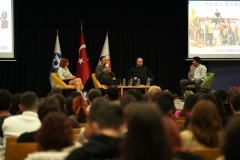
‘Mortal World 2’ actors at IUE
Sarp Apak and Ahmet Mümtaz Taylan, the actors of the film ‘Ölümlü Dünya 2’ (Mortal World 2), which has garnered significant attention
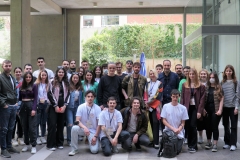
500 students met at the 'festival'
Izmir University of Economics (IUE) Vocational School held one of the biggest design and creativity festivals in the city. 500 students participating
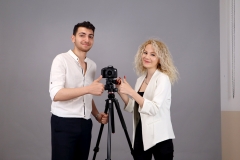
PA’s to the world-famous program from IUE
Hilal Yapıcıoğlu and Doğukan Sözen, students of Izmir University of Economics (IUE) Radio and Television Programming, worked as 'production assistants' in the
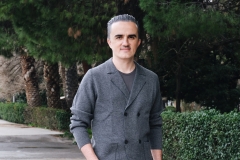
Turkish photography will be promoted in Italy
IUE Lecturer Emre Küheylan was invited as a curator and speaker to the world-famous photography festival called 'Photolux' to be held in

'Turkish coffee' and 'fortune telling' became a documentary
'Turkish coffee', which has become one of the indispensable values of our culture, inherited from centuries ago, and 'coffee fortune-telling', which many
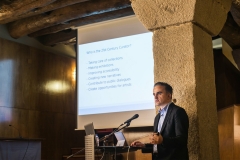
The first Turkish person in the giant jury
Emre Küheylan, Lecturer at Izmir University of Economics (IUE), who has works that made a difference in photography, whose works are exhibited
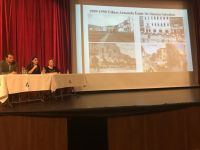
IZMIR CINEMAS WILL REVIVE
Film industry has been addressed at the “Revive Cinema in Izmir Again!” themed panel that took place on Thursday, December 20 at

